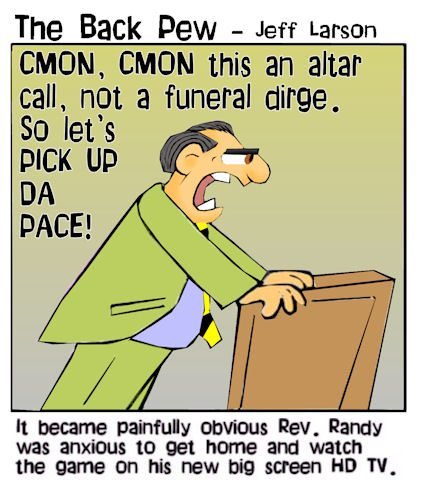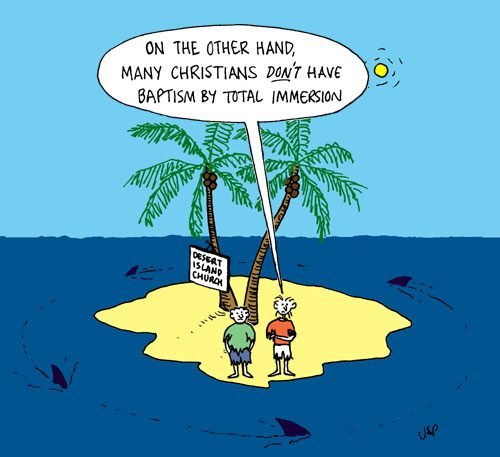
I came of age in the Independent Fundamentalist Baptist (IFB) church movement. At the age of fifteen, I was saved, baptized, and called to preach at Trinity Baptist Church in Findlay, Ohio. Gene Millioni, Ron Johnson, and Bruce Turner were my pastors at the time. (Please see Dear Bruce Turner.) Trinity Baptist was a hyper-evangelistic church affiliated with the Baptist Bible Fellowship. My pastors gave a public altar call at the end of every service. I later would attend Midwestern Baptist College to study for the ministry. Students were required to attend nearby Emmanuel Baptist Church, pastored by college chancellor Dr. Tom Malone. Altar calls were given at every service. Most IFB churches sang Just as I Am during altar calls, but Emmanuel used There is a Fountain Filled With Blood (Drawn from Immanuel’s Veins), by William Cowper. Sinners needing salvation were asked to step out of their seats and walk down the aisle to the front of the church. Once at the altar, a trained soulwinner would kneel with them, share the IFB gospel, and help them pray the sinner’s prayers. This act of faith was called “making a public profession of faith.” Sinners evangelized during the week were expected to come to church the next Sunday and made their conversion public by walking down the aisle.
Baptism was treated in a similar manner. Being immersed in three feet of water in a church baptismal was considered a public declaration of faith. By being baptized, the sinner was saying, “I publicly identify with Jesus.” Many IFB converts are baptized right after the service or the next Sunday. Preachers would often joke that the reason Baptists baptized new converts right away is that they feared never seeing them again. I was saved one week and baptized the next. And several weeks after that, I went forward during the altar call and confessed to Pastor Millioni that I believed God was calling me to preach. I stood before my friends and fellow church members and told them what God was doing in my heart. My declaration was greeted with hearty amens from older congregants. I am sure more than a few of my friends thought, Bruce Gerencser, a preacher? Yeah, right. This too shall pass! It didn’t, and for the next thirty-five years, I preached some version or the other of the Christian gospel, seeking to help sinners see their need for salvation.
Over the first fifty years of my life, I watched thousands of people walk down church aisles and ask Jesus to save them. Often, high pressure, manipulative tactics were used to coerce sinners into getting saved. I heard countless preachers say, “the hardest decision you will ever make in your life is to step out of your seat, walk down the aisle, and make a public profession of faith.” The same line was used when cajoling people into getting baptized. “Publicly identifying with Jesus in baptism is the hardest decision you will ever make!” I later concluded that there was nothing “hard” about these decisions. Here you were among Christians. How “hard” could it be to get saved and baptized? And “public?” What’s “public” about going through the IFB salvation and baptismal ritual in the safety and privacy of a local church filled with likeminded believers?

Later in my ministry years, I stopped baptizing new converts at the church. Instead, we would go to a nearby public lake and hold a baptismal service. While not as “public” as the baptisms of first century Christian converts in the book of Acts, being exposed to the gazes of worldly vacationers helped cement the importance and cost of publicly identifying with Christ. Few churches, it seems, are willing to ask much, if anything, from new converts. As long as their asses are in the seats and their Benjamins are in the plate, all is well. It is not uncommon for IFB churches to leads hundreds of sinners to Christ each year, with few of them obediently following the Lord in baptism. Some megachurches these days have pretty much given up on baptizing converts. Once or twice a year, they will “offer” baptism to the unbaptized, but rarely, if ever, stress the importance of the rite.
These days, much to the consternation of IFB preachers and Evangelical pastors, cultural Christianity rules to roost. Christians have “personal” relationships with Jesus, and most of them never share their faith. Recently, the Southern Baptist Convention — the largest Protestant denomination in the United States — reported that their membership and baptism numbers continue to decline. Scores of SBC churches didn’t take in one new member or baptize one new convert. IFB churches, who still think they live in the glory days of the 1970s and 1980s, also face precipitous membership and baptism declines. One-time IFB megachurches now are a shell of what they once were, that is, if they are still in existence. In the 1970s, Polly and I attended Emmanuel Baptist Church in Pontiac, Michigan. Emmanuel was considered one of the largest churches in America. One Sunday, they had over 5,000 people in attendance — a rare feat at the time. Today, its doors are shuttered. The same could be said for numerous other IFB churches — churches that once proudly proclaimed that they were one of the top one hundred churches in America.
It is not uncommon these days for IFB and SBC churches to go weeks and months without “public” professions of faith or a “public” baptisms. More than a few churches, attempting to ward off algae growth or smells that come from stagnant water, have drained their baptismals and use the space to store Christmas decorations or old VBS materials. The best and brightest among such churches will come up with new programs and outreaches they are sure will stop the bleeding and import new life into their churches, but if the past is any indicator, they are doomed for failure. Perhaps, it’s time to admit that Americans are really not that into Jesus anymore; that all people want is eternal life insurance and a place to get married and hold funerals. In other words, IFB and SBC congregants are well on their way to becoming Roman Catholics — morning glories who only bloom on Easter and Christmas.
In one regard, the testimony of such Christians is indeed “public.” The unwashed, uncircumcised Philistines of the world “see” how these people live out their faith, and find themselves saying, “no thanks.” My wife and I visited over a hundred Christian churches after we left the ministry. We were desperately looking for a Christianity that mattered; a congregation that took seriously the teachings of Jesus. While we met all sorts of decent people, we didn’t find one church congregation that was different from the rest. We didn’t find one church that earnestly took Jesus’ commands, teachings, and way of life — as we then understood them — to heart. (Please see But Our Church is DIFFERENT!) We decided that despite differences in liturgy and denominational affiliation, these churches were all pretty much the same. In retrospect, I have no doubt this fact played a part in our eventual abandonment of Christianity. We came to understand that for all their talk about commitment, public professions of faith, and publicly identifying with Jesus, most Evangelical churches were little more than private social clubs for likeminded people; that such clubs attract people who need “forgiveness” and need someone to tell them what to believe and how to live. Sadly, the sheeple underneath the steeple far outnumber people who think for themselves. Those who are able to rationally and critically examine religious beliefs and practices usually end up outside of the churches they once called home.
Conservative Christianity still dominates the American social and political scene. Evangelical culture warriors continue to wage war against secularism, atheism, humanism, socialism, and a culture they believe is going to Hell in a handbasket. Try as they might, these crusaders are fighting a losing battle. Oh, they might win a few skirmishes in the short term — say over abortion — but history suggests that their days are numbered. One need only look at the arc of history in Europe and other Western countries to see where the United States is headed. Old curmudgeons such as myself are unlikely to see secularism and reason vanquish the Devil in our lifetimes, but we hold out hope for our grandchildren and their children. Thanks to global warming, their world will be very different from ours, but we have high hopes that their world will be one where religion has finally been driven back into the four walls of churches where it belongs.
About Bruce Gerencser
Bruce Gerencser, 62, lives in rural Northwest Ohio with his wife of 41 years. He and his wife have six grown children and twelve grandchildren. Bruce pastored Evangelical churches for twenty-five years in Ohio, Texas, and Michigan. Bruce left the ministry in 2005, and in 2008 he left Christianity. Bruce is now a humanist and an atheist. For more information about Bruce, please read the About page.
Thank you for reading this post. Please share your thoughts in the comment section. If you are a first-time commenter, please read the commenting policy before wowing readers with your words. All first-time comments are moderated. If you would like to contact Bruce directly, please use the contact form to do so.
Donations are always appreciated. Donations on a monthly basis can be made through Patreon. One-time donations can be made through PayPal.

I would love to see meanspirited, judgmental evangelical Christianity die out. In fact, I live in an area where it’s in the minority, overshadowed by a variety of other faiths and no faith. Maybe the Trump years are its last grasp on political influence – I don’t know. It does appear that younger people are abandoning religion in droves, but there’s always the potential that some sort of upheaval (a disaster, a social movement, etc) will bring them back.
Fundamentalism will likely always come and go in a cyclical fashion. Religion does tend to ebb when a society is fat and happy, as things are now. Unfortunately, it is unlikely to last forever. When people are scared they revive the ancient superstitions.
As far as U.S. politics in the next 50 years, the ebb of religion is the best way to put the kibosh on the loonies that have taken over the Republican party.